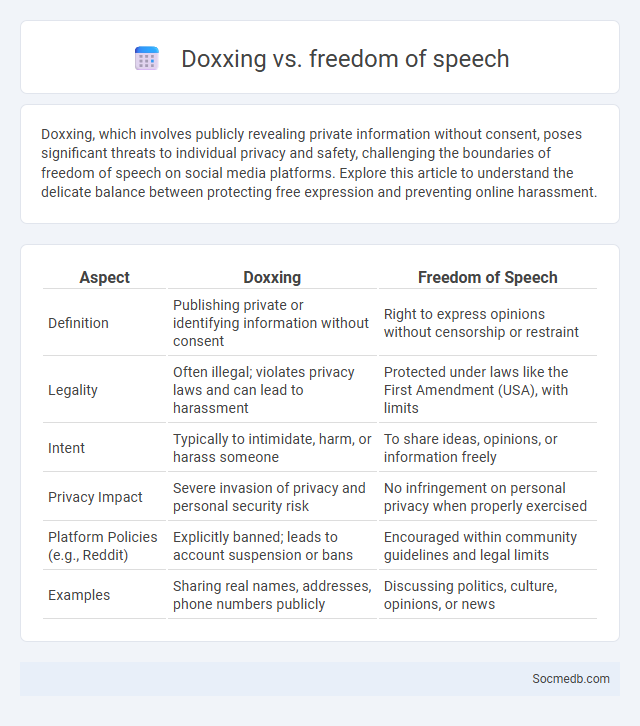
Photo illustration: doxxing vs freedom of speech
Doxxing, which involves publicly revealing private information without consent, poses significant threats to individual privacy and safety, challenging the boundaries of freedom of speech on social media platforms. Explore this article to understand the delicate balance between protecting free expression and preventing online harassment.
Table of Comparison
| Aspect | Doxxing | Freedom of Speech |
|---|---|---|
| Definition | Publishing private or identifying information without consent | Right to express opinions without censorship or restraint |
| Legality | Often illegal; violates privacy laws and can lead to harassment | Protected under laws like the First Amendment (USA), with limits |
| Intent | Typically to intimidate, harm, or harass someone | To share ideas, opinions, or information freely |
| Privacy Impact | Severe invasion of privacy and personal security risk | No infringement on personal privacy when properly exercised |
| Platform Policies (e.g., Reddit) | Explicitly banned; leads to account suspension or bans | Encouraged within community guidelines and legal limits |
| Examples | Sharing real names, addresses, phone numbers publicly | Discussing politics, culture, opinions, or news |
Defining Doxxing: Scope and Impact
Doxxing involves the malicious act of publicly revealing someone's private information, such as addresses, phone numbers, or financial details, without their consent on social media platforms. This invasive practice significantly threatens online privacy and personal security, often leading to harassment, identity theft, and real-world harm. Protecting Your digital footprint requires vigilant privacy settings and awareness of the potential consequences of oversharing on social media.
Freedom of Speech: Rights and Responsibilities
Freedom of speech on social media platforms empowers you to express opinions and access diverse information, but it comes with the responsibility to avoid hate speech, misinformation, and harassment. Social media companies implement policies to balance users' rights with community safety, enforcing rules that protect free expression while preventing harm. Understanding these rights and responsibilities helps you navigate online interactions respectfully and lawfully.
Personal Information Doxxing: What Counts as Sensitive Data?
Personal information doxxing involves the unauthorized sharing of sensitive data such as full names, home addresses, phone numbers, social security numbers, financial details, and private photos. Your digital security can be severely compromised when this data is exposed on social media platforms, leading to identity theft, harassment, and privacy violations. Protecting such sensitive information requires vigilant privacy settings, cautious sharing habits, and awareness of what constitutes personal data at risk.
Legal Boundaries: Doxxing vs. Free Expression
Legal boundaries on social media require careful navigation between protecting free expression and preventing harmful actions like doxxing, which involves publicly sharing private information without consent. Your rights to express opinions are safeguarded under free speech laws, but these do not extend to violating someone's privacy or enabling harassment. Understanding the distinction between lawful expression and illegal doxxing is essential to avoid legal repercussions and maintain a respectful online environment.
Ethical Dimensions of Online Disclosure
Navigating the ethical dimensions of online disclosure requires careful consideration of privacy, consent, and transparency in social media interactions. You must balance sharing authentic content with respecting others' boundaries and avoiding oversharing sensitive information that could harm personal or professional reputations. Understanding the impact of digital footprints and data permanence is crucial for responsible social media use.
Real-World Consequences: Victims of Doxxing
Victims of doxxing on social media face severe real-world consequences, including identity theft, harassment, and threats to personal safety. Exposure of private information can lead to job loss, cyberstalking, and emotional distress, significantly impacting mental health. Law enforcement agencies report increased cases where doxxing results in offline violence and long-term reputational damage.
Protecting Privacy in the Digital Age
Protecting privacy in the digital age requires robust encryption protocols and strict data management policies to secure personal information on social media platforms. Users must enable two-factor authentication, regularly update privacy settings, and remain vigilant against phishing scams to prevent unauthorized access. Social media companies have a critical role in implementing transparent data usage practices and complying with regulations like GDPR to safeguard user privacy.
When Free Speech Crosses Into Doxxing
Free speech on social media is protected, but it crosses into doxxing when private information such as home addresses, phone numbers, or personal identification is shared without consent, putting individuals at risk. Platforms enforce strict policies to prevent doxxing due to its potential to cause harassment, threats, and privacy violations. Protect Your online presence by understanding these boundaries and reporting any instances where free speech is misused to expose sensitive personal data.
Strategies for Preventing Personal Information Doxxing
Implement strict privacy settings on your social media profiles to limit the visibility of personal information to trusted contacts only. Use strong, unique passwords and enable two-factor authentication to protect your accounts from unauthorized access. Avoid sharing sensitive details like your home address, phone number, or daily routines publicly to minimize the risk of doxxing attacks.
Balancing Civil Liberties and Online Safety
Protecting civil liberties while ensuring online safety requires implementing clear content moderation policies that respect freedom of expression and privacy rights. Platforms must use transparent algorithms to identify harmful content without infringing on individual liberties, promoting a safe digital environment. Collaboration between governments, tech companies, and civil society is essential to create balanced regulations that uphold democratic values and protect users from online threats.
 socmedb.com
socmedb.com